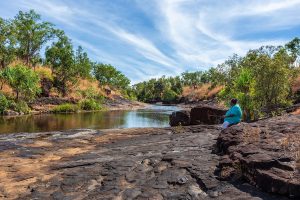- SIWI – Leading expert in water governance
- /
- Latest
- /
- Analysis of NDC enhancement: Possible gaps
Analysis of NDC enhancement: Possible gaps

While enhanced Nationally Determined Contributions (NDCs) have seen much improvement, there are still gaps and challenges that should be addressed as part of the next iteration, and within Long Term Strategies (LTS).
While it seems early to be anticipating the next NDCs, more foundational work on some topics will be required. For example, addressing transboundary concerns will require more engagement and exchange on activities. It will also require commitments of present and future NDCs between basin parties on a more regular basis as it can be difficult to incorporate transboundary matters within limited national preparation timeframes.
Governance
Overall, references to governance around water was highly limited.More attention to this as well as adaptation and mitigation governance may be required. Some parties made explicit references to water governance, including Cabo Verde, Colombia, and Congo. New forms of water and climate change governance may be required over the long term, whether in the development of new institutions or through the evolution of existing ones like national or regional river basin organizations. Governance changes may be connected to the role of basin and watershed planning that will be important in implementing national priorities at local levels.
Sub-national impact
Impacts from climate change will have different effects across states and basins. Different parts of a State will experience changes in their hydrological profile, leading to primary, secondary, and tertiary impacts in local economies. Reduced rainfall in a region may lead to an increased dependence on groundwater resources. In turn, dependance on groundwater may impact on existing resource users who adject their behavior accordingly, leading to changes in local activities. Most enhanced NDCs still addressed commitments from a national perspective, although NDCs prepared by Argentina, Colombia, and Benin for example showed an increased recognition of sub-national commitments, risks and responses. For parties where adaptation is a priority, more attention to local catchments will be a necessary part of implementation.
Transboundary considerations
There are still limited measures relating to transboundary matters. Whilst NDCs are necessarily focused on national commitments, there remains a concern that upstream and downstream ambitions of different parties may impede the ambitions or commitments of others, whether though adaptation or mitigation measures . These risks are not always made clear.
Most consultation processes are national in scope, with predominantly national stakeholders. There may be engagement with external such as transboundary river basin authorities, but this is not a given. Much of the target setting and ambition raising is undertaken in a relatively short timeframe. Stakeholder and ministerial engagement can be difficult within state institutions, let alone including external parties. In addition, NDCs processes often run at different timetables between neighboring parties, making it more difficult to engage in a meaningful way. Supporting inter-state exchanges on the commitments in their enhanced NDCs should be considered at the earliest possible stage, in order to have more coordinated activities recognized in the next iteration of NDCs.
Cross-sectoral analysis
Whilst water certainly increased in its prominence across different iterations of the NDCs, most of the examination or activities around water were in respect to water resource use within a given sector. Many different sectors are reliant on the same water resource, but interactions between different sectors was rarely examined within NDCs. A few NDCs, such as those from Nigeria, Sierra Leone, and Sri Lanka did note some measures which explicitly recognized that the activity had benefits for other sectoral uses of water. Approaches including Integrated Water Resource Management (IWRM)and basin/watershed planning may be useful to recognize local interactions
Other posts in the series
This blogpost is part of a small series that looks at the way that water and water-related activities have been included within the most recent round of Nationally Determined Contributions (NDCs) prepared in the lead-up to COP26 in Glasgow, United Kingdom.

Analysis of NDC enhancement: Integrative approaches
- Water and the 2030 Agenda
- Water governance
- Water and climate

Analysis of NDC enhancement: Increased role for water and water-related activities
- Indigenous knowledge
- Water and the 2030 Agenda
- Water and climate
- Gender and water

Analysis of NDC enhancement: First impressions
- Water and the 2030 Agenda
- Water governance
- Water and climate

Analysis of NDC enhancement: Foundations
- Water and the 2030 Agenda
- Water and climate
- Indigenous knowledge
Most recent

SIWI’s endorsement of the COP29 Declaration on Water for Climate Action
- Water and climate
- World Water Week
- Water governance

SIWI-WASH experts join IVL
- Water, Sanitation and Hygiene (WASH)
- Water governance

Women hold the key to building climate resilience
- Gender and water
- Resilience through water

Reflections from World Water Week 2024: Unlocking Water Cooperation Solutions

The Road to Water Action in 2024 – Join us at World Water Week

Fostering cooperation at World Water Week’s Opening Ceremony


